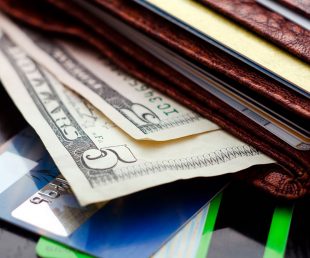With a new year underway, people are often ambitiously setting goals to improve their health and overall wellness. More exercise. Better eating. Drinking more water. All certainly contribute to a healthier lifestyle, but don’t overlook the impact that improving your financial health can have on your physical and mental health.
Financial stress has physical consequences. One study, conducted by Harris Poll on behalf of the American Institute of CPAs, revealed that 39% of Americans with debt feel anxious at the thought of how they’ll pay it off. One-quarter of survey respondents also reported that they stress about their debt at bedtime, and one-third stress about everyday financial decisions.
Finding ways to improve your financial health reduces this anxiety and stress, and gives your overall health a boost. Here are four ways to significantly decrease your money worries and get financially fit in 2019.
1. COMMIT TO PAYING ATTENTION
A big part of financial wellness is understanding your own financial life. This includes how you’re spending your money, how much you are saving, and hidden expenses that impact your cash flow. For many people, examining their expenses causes stress. But in the case of personal finances, knowledge is power. So pull back the veil on your spending and become an expert on your own finances. Take advantage of technology to help. For example, a personal finance or budgeting app makes tracking your expenses—and staying on track with your budget—that much easier. Experiment with a buy nothing day, or even week, as a way to highlight what you regularly purchase and whether you truly need it. Also consider allocating a specific amount of cash for discretionary items such as coffees, lunches, and movies each week. Using only cash to buy make those purchases adds a level of scrutiny and thought to what is often mindless spending.
2. ADDRESS YOUR HIGH INTEREST DEBT
If you have credit card debt, you’re certainly not alone: The average U.S. household has $9,333 in credit card debt. That said, making a plan to reduce and eventually pay off your debt is a great way to start the new year. The act of simply coming up with a plan can go a long ways toward alleviating anxiety caused by the money owed. There are several methods for reducing debt. In some cases, consolidating your credit cards into one card and then whittling away that balance makes sense. Others may prefer to pay off debts one at a time. Whatever works, create a plan and then stick to it. Knocking down your debt will improve your credit score, make it easier to save, and help reduce your financial stress.
3. AUTOMATE YOUR SAVINGS
Financial experts are fond of the saying “pay yourself first.” By automating savings, you do just that—ensuring that you save money from your paycheck before it gets spent. Many employers provide an automated paycheck deduction for retirement savings. If you’re not already taking advantage of this option, set up automatic deductions for 2019. (And be sure to save enough to capture any employer match offered). For savings beyond retirement, such as an emergency fund, you can automate savings using your bank. Simply denote how much you want moved into savings from your checking each month. Even if the amounts are small, saving regularly adds up and provides a pleasant surprise at the end of the year.
4. DECREASE YOUR RISK
A big part of improving financial health is setting up safety nets so that an unexpected financial issue doesn’t turn into a significant hardship. Fortunately, there are multiple ways you can reduce the risk of financial trouble. Start by examining your insurance and whether you’re properly covered with medical, renter’s insurance, and auto insurance. Ask your employer about short-or-long-term disability, which provide income in the event you’re unable to work. Also create an emergency savings fund that you can dip into for surprise expenses, whether that’s a medical bill, home repair, or sudden job loss. Experts recommend saving three- to six months worth of expenses in an emergency account. But stashing even $500 or $1,000 to start is enough to offset unplanned costs and keep you from going into debt.
Your mental and physical health are closely tied with your financial health. Work to improve the latter, and you’ll reduce stress and anxiety, sleep better at night, and feel better all around.


